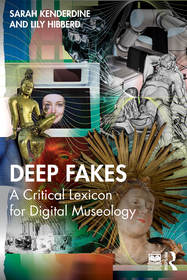
Deep Fakes
A Critical Lexicon for Digital Museology
-
10% KEDVEZMÉNY?
- A kedvezmény csak az 'Értesítés a kedvenc témákról' hírlevelünk címzettjeinek rendeléseire érvényes.
- Kiadói listaár GBP 42.99
-
20 538 Ft (19 560 Ft + 5% áfa)
Az ár azért becsült, mert a rendelés pillanatában nem lehet pontosan tudni, hogy a beérkezéskor milyen lesz a forint árfolyama az adott termék eredeti devizájához képest. Ha a forint romlana, kissé többet, ha javulna, kissé kevesebbet kell majd fizetnie.
- Kedvezmény(ek) 10% (cc. 2 054 Ft off)
- Kedvezményes ár 18 484 Ft (17 604 Ft + 5% áfa)
Iratkozzon fel most és részesüljön kedvezőbb árainkból!
Feliratkozom
20 538 Ft

Beszerezhetőség
Még nem jelent meg, de rendelhető. A megjelenéstől számított néhány héten belül megérkezik.
Why don't you give exact delivery time?
A beszerzés időigényét az eddigi tapasztalatokra alapozva adjuk meg. Azért becsült, mert a terméket külföldről hozzuk be, így a kiadó kiszolgálásának pillanatnyi gyorsaságától is függ. A megadottnál gyorsabb és lassabb szállítás is elképzelhető, de mindent megteszünk, hogy Ön a lehető leghamarabb jusson hozzá a termékhez.
A termék adatai:
- Kiadás sorszáma 1
- Kiadó Routledge
- Megjelenés dátuma 2025. november 11.
- ISBN 9781032369150
- Kötéstípus Puhakötés
- Terjedelem286 oldal
- Méret 234x156 mm
- Súly 453 g
- Nyelv angol
- Illusztrációk 99 Illustrations, black & white; 99 Halftones, black & white 700
Kategóriák
Rövid leírás:
Deep Fakes: A Critical Lexicon for Digital Museology is an illustrated monograph articulated through a comprehensive lexicon of key concepts in next generation museology.
TöbbHosszú leírás:
Deep Fakes: A Critical Lexicon for Digital Museology is an illustrated monograph articulated through a comprehensive lexicon of key concepts in next-generation museology. Each of the book’s ten chapters explores specific terms in the lexicon, further interpreted through installations from the 2021 exhibition Deep Fakes: Art and Its Double in Switzerland.
Deep Fakes: A Critical Lexicon for Digital Museology contends with the intensification of questions compounded by rapid technological change affecting contemporary museological and curatorial authority. This book introduces a novel theorization of computational techniques and their transformation of museological objects in the form of cultural deep fakes—the consummate shape-shifting doppelgängers of the post-digital age. Conceived by Sarah Kenderdine and written by Lily Hibberd, this volume elaborates on a spectrum of established theoretical concepts, including affect, aura, authenticity, embodied knowledge, mimesis, the post-original, presence, replication, reenactment, and the simulacrum. Grounded in the methods and techniques of computational museology and participatory visitor experience, it critically examines the practical, epistemological, societal, and ethical implications of emerging technologies and their cultural heritage material. Harnessing the affordances of these transformative approaches for communities and societies, this critical lexicon empowers future-focused curatorship for memory organizations.
This book supports museum professionals in navigating the ramifications of dynamic technological change. Readers include directors, curators, researchers, and designers. Archival and imaging scientists, data managers, and software engineers are also broadly implicated. It has added significance for research disciplines in the history and theory of art and media studies, critical and cultural theory, digital humanities, and museum studies, alongside artists and producers in the cultural domain.
TöbbTartalomjegyzék:
Introduction; Lexicon; Chapter 1 Deep Fakes: Art and Its Double — the exhibition; Chapter 2 New materialities; Chapter 3 New mimetics; Chapter 4 Simulacrum; Chapter 5 Reenactment; Chapter 6 Peripheral vision; Chapter 07 New values; Chapter 08 Speaking back; Chapter 09 Paradigms of participation; Chapter 10 Voices of visitors; Conclusion — Towards future-focused curatorship; End matter; List of illustrations
Több



